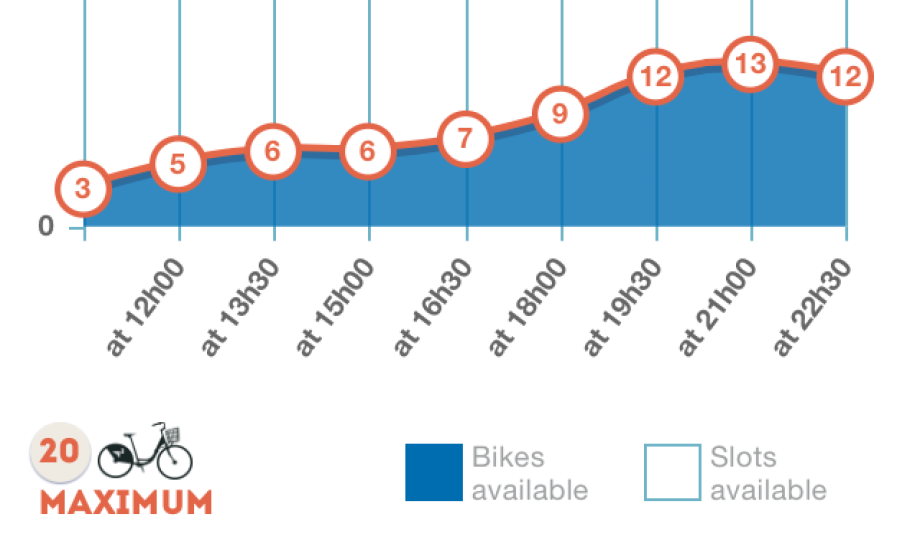 Bordeaux-based big data startup Qucit released this month the world’s first bikeshare predictive API. It is tightly integrated in iPhone and Android app La Bonne Station (the new iPhone version was released yesterday).
Bordeaux-based big data startup Qucit released this month the world’s first bikeshare predictive API. It is tightly integrated in iPhone and Android app La Bonne Station (the new iPhone version was released yesterday).
The app uses the API to power a visualization of predicted bike availability over 12 hours in the future, at any given station of Bordeaux’s public bikes network. The technology behind the API comes from 3 years of Research & Development effort and will continue its development in collaboration with the Labri and the IMB research institutes in Bordeaux. It is based on custom machine learning techniques applied to 4 years of historical data on bikeshare usage, enriched with additional contextual data such as weather conditions.
Predictive apps for a smart city
 La Bonne Station is an app (available in French and in English) that is edited by Keolis, the public transport operator in Bordeaux. The new predictive functionality has been largely promoted by Keolis as they’ve put promotional seat covers on bikes all over the city.
La Bonne Station is an app (available in French and in English) that is edited by Keolis, the public transport operator in Bordeaux. The new predictive functionality has been largely promoted by Keolis as they’ve put promotional seat covers on bikes all over the city.
In a previous article, we saw how predictive technology was being used in connected objects. This new app by Qucit and Keolis is a great example of how predictive apps are also being adopted by end users in their daily lives. It addresses two major problems for those who rely on public bikes for transportation: arriving at an empty station when on foot, and arriving at a full station when on a bike. Users can now anticipate and directly go to the right station — hence the name “la bonne station” in French!
What would be even cooler would be to have an integration with Snips’ Pocket Brain (another French startup) which will predict when you need the bike app — and potentially predict where you’re going. Speaking of this, Uber recently published a blog post in which they explained how they manage to predict a user’s destination address with 74% accuracy.
Another important aspect of Qucit’s technology is its “smart city” impact. Qucit works in close collaboration with Effia, Keolis’ subsidiary which deals with the maintenance of the bikes network. They’re looking at ways to improve load balancing, performed by maintenance trucks that move bikes around the city.

An idea could be to equip staff with tablets that leverage the predictive API to anticipate bike usage and to better decide where maintenance/load-balancing trucks should go — before stations become empty or full. This could both improve maintenance’s operations and the end-user experience.
These days, Qucit is also monitoring calls to its API in order to get insights into how the predictive feature is being used: which requests are made, how far in advance, how far from the current position of the user, etc.
Future challenges
To me, the logical next step for the company would be to replicate what they’ve done in Bordeaux to other cities that are also operated by Keolis. Hopefully they will also be able to bring the technology to Paris’ velibs soon (operated by JC Decaux). The current revenue model mixes a fixed fee for setting up the API and a recurring fee for access to the API. If Qucit decides to focus on replicability and scaling, I’m guessing they should be able to lower the setup fee and to transition to a recurring model.
On a technical aspect, they may need to keep updating their predictive models since people’s habits may change, as more of them will adopt the new predictive feature. Let me explain. The current models assume that, in any given context, users’ behavior is fixed. Overall, it’s probably true that behavior hasn’t changed much since the predictive feature came out. But when adoption reaches a critical level, this assumption won’t be reasonable any more. Consider this example: if many users ask for predictions of available bikes at a given station A, and predictions say there will be none at A but plenty at next station B, then all these users will go to B instead of A; as a consequence, there will be more bikes available at A than predicted, and less at B.
This won’t be a problem at first, but when the predictive app reaches a critical mass of users, Qucit may need to transition from predictive to prescriptive: instead of telling users what’s going to happen, they could recommend them what to do (i.e. they will just tell you which station to go to).
Qucit (for “Quantified Cities”) was founded a year ago by CEO Dr Raphaël Cherrier, a former physics lecturer and researcher at ENSAM. The startup now counts 7 people, it is self-funded and it has received grants from Bpifrance for being a laureate of the Concours National d’Aide à la Création d’Entreprises Innovantes [in French] and of the Concours Mondial de l’Innovation (“worldwide innovation challenge”) in which any company — big or small — that is based or has a subsidiary in France can compete.
If you’re interested in finding out more about predictive APIs and predictive apps, check out the PAPIs.io conference in Barcelona on 17–18 November 2014. Qucit and other innovative companies will be showcasing their technology. Use discount code RBPAPIS to get 20% off on registration.

